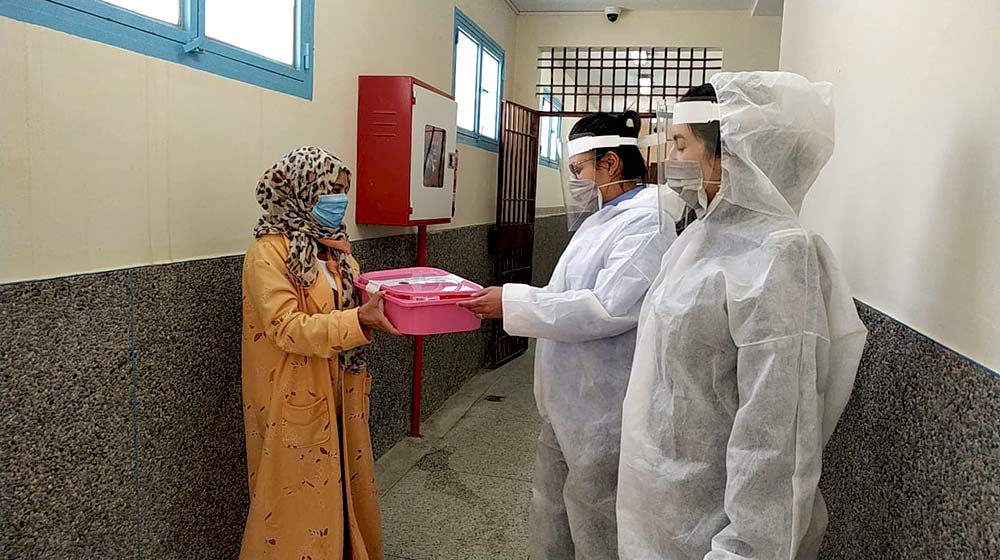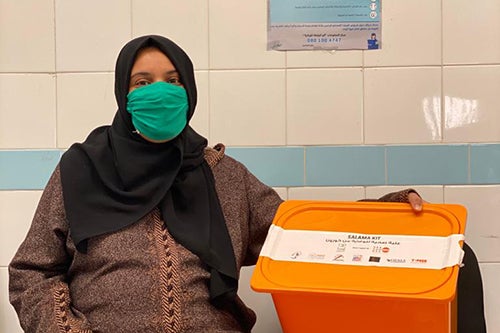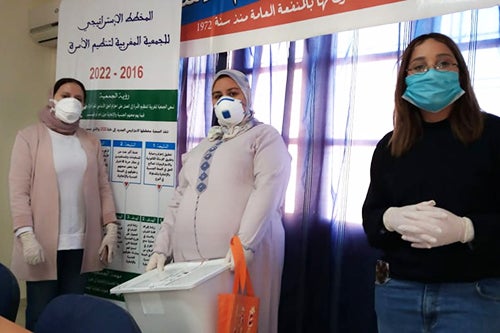UNFPA’s Operation SALAMA reaches millions of Moroccans with pandemic information, supplies, support
July 28, 2020

RABAT, Morocco – When the COVID-19 pandemic arrived in Morocco in March, alarm spread through the country. “At the start of the pandemic, we were very worried about our health,” Halima*, a migrant woman from Madagascar, told UNFPA. Operation SALAMA was there to help.
Morocco declared a state of emergency and implemented strict movement restrictions. Within three months of enacting these measures, Morocco had one of the lowest fatality rates from coronavirus in the world.
The Government worked to reduce disease transmission and limit the impact of the pandemic on at-risk communities. Operation SALAMA – which translates to Operation Safety – was one of these measures.

Launched in late March, UNFPA’s Operation SALAMA worked across multiple fronts to prevent COVID-19. The program spread accurate information about disease prevention, protected health professionals and pregnant women from COVID-19, and minimized the economic effects of the pandemic on the most vulnerable people.
In total, more than 16 million people were reached with disease-prevention information via television, radio and online communications.
Halima was among them. Now, she said, “we will protect ourselves well against the coronavirus”
Operation SALAMA Kits, continuity of care
UNFPA also worked with health officials to ensure maternal health services remained available, even as the health system grappled with tens of thousands of COVID-19 cases.
Maternal health facilities were adapted to reduce the risk of coronavirus exposure. Health workers also received “SALAMA kits” containing protective equipment and sanitation supplies. More than 700 health-care professionals attended remote training sessions about disease prevention and management.
SALAMA kits were also distributed to vulnerable groups, including migrants, older people, persons with disabilities, survivors of violence, adolescents, and incarcerated people.

Nearly 8,000 people received these kits.
“The SALAMA kit could not have come at a better time,” said Kawtar, a survivor of violence.
“This initiative has allowed me to protect myself and my family,” added Nadia, a person with a disability. She had been unable to purchase hygiene supplies and other essentials due to her precarious economic situation.
The accurate and clear information packet “helped us to have more information about the coronavirus and ways to better protect ourselves,” said Driss, an elderly person living in a senior center.
Support for survivors, economically vulnerable
UNFPA’s Operation SALAMA worked to minimize the impact of the pandemic on vulnerable communities.
Globally, pandemic-related lockdowns and stresses have led to higher rates of violence against women and girls. Yet at the same time, movement restrictions and facility closures have limited the availability of services for survivors of violence.
In Morocco, Operation SALAMA established a helpline to allow survivors to seek assistance. The program implemented remote counselling systems and services. From March to June, some 106 survivors of violence were able to receive support though these new mechanisms.
Economically vulnerable women benefited from income-generating opportunities.

Larimode, a clothing company, expanded its operations to create jobs, for instance. “The company has outsourced part of its production to integrate single mothers into employment and provide them with a stable and dignified income,” said CEO Meriem Larini.
In addition, the building materials company BCSS created opportunities for “vulnerable women in this period of crisis,” the company’s CEO, Chaibia Balbzioui Alaoui, noted.
In total, around 30 women have found stable employment through Operation SALAMA.
SALAMA at Work
UNFPA’s Operation SALAMA drew to a close in mid-June.
Over its three months of operation, the program reached 275 facilities. These included health centers, maternity hospitals, social protection centers, prisons, child protection centers, and women’s homess. The program covered more than 90 urban and rural localities.
The programme brought together a wide range of partners, including the Government, civil organizations, youth groups, health worker associations and the private sector. It also received support from the Canadian and Belgian embassies in Morocco.
As a follow-up, UNFPA has launched the “SALAMA at Work” initiative, which continues efforts to raise awareness about COVID-19 prevention. The initiative is also removing barriers to care and support services, promoting healthy behaviors. This is all to create safe and inclusive working environments that respect for women’s rights, dignity and equality.
* Name changed for safety and privacy
See also: World Population Day: The most vulnerable populations at the heart of UNFPA’s response to COVID-19
Unfpa.org originally published a version of this article.